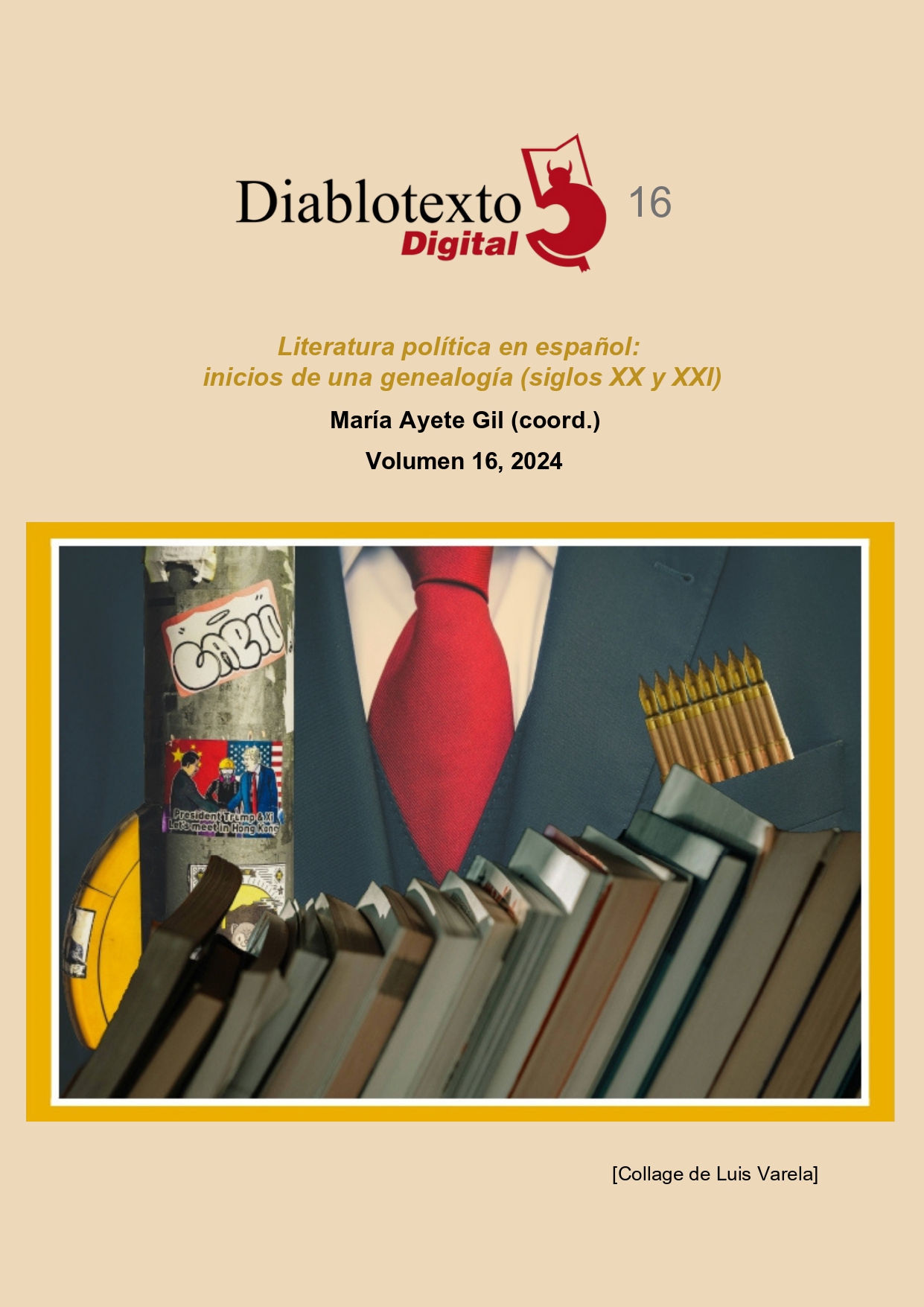Theatrical Practice and Ideological Displacement: The Brecht of Juan Carlos Rodríguez
DOI:
https://doi.org/10.7203/diablotexto.16.29395Keywords:
ideological unconscious, distancing effect, ideology, literature, theatre Abstract
Abstract
The purpose of this text is to explain the theory of the ideological unconscious, as developed by the literature professor Juan Carlos Rodríguez in his book Teoría e historia de la producción ideológica (1974), and as it has been progressively elaborated in subsequent studies up to the present century. For this purpose, the literary and theoretical or reflexive work of Bertolt Brecht will be used as an illustration, since Rodríguez also studied this author, and his approach to the distancing effect reveals, among other things, its support in a necessarily political (and therefore historically changing) conception of literature. The ultimate aim of the article is to deepen the understanding and originality of this thinker’s work programme.
 Downloads
Downloads
 References
References
ADORNO, Theodor (2007). “Commitment”. En Theodor Adorno, Walter Benjamin, Ernst Bloch, Bertolt Brecht, Georg Lukács, Aesthetics and Politics. Londres: Verso, pp. 267-299.
ALTHUSSER, Louis (1968). “El ‘Piccolo’, Bertolazzi y Brecht (notas acerca de un teatro materialista)”. En Louis Althusser et al., Para leer El capital, Buenos Aires: Siglo XXI.
ALTHUSSER, Louis (1976). Positions. París: Éditions sociales.
ALTHUSSER, Louis (2019). Las vacas negras. Entrevista imaginaria. Madrid: Akal.
BARTHES, Roland (2011). El grado cero de la escritura. Buenos Aires: Siglo XXI.
BENJAMIN, Walter (2007). “Conversations with Brecht”. En Theodor Adorno, Walter Benjamin, Ernst Bloch, Bertolt Brecht, Georg Lukács, Aesthetics and Politics. Londres: Verso, pp. 121-133.
BRECHT, Bertolt (1978). On Theatre. Nueva Delhi: Radha Krishna.
BRECHT, Bertolt (1995). Teatro completo, 7. Madrid: Alianza.
BRECHT, Bertolt (2014). Escritos sobre teatro. Barcelona: Alba Editorial.
BRECHT, Bertolt (2016). Journals 1934-1955. Londres: Bloomsbury.
BRECHT, Bertolt (2019). Refugee Conversations. Londres: Meuthen Drama.
CAAMAÑO, Juan Manuel (2004). The Hieroglyph: Literature, Criticism and The Ideological Unconscious. Tesis doctoral. Nueva York: Stony Brook University.
HIDALGO Nácher, Max (2022). Teoría en tránsito. Arqueología de la crítica y la teoría literaria españolas de 1966 a la posdictadura. Santa Fe: Ediciones UNL.
JAMESON, Fredric (1971). “Metacommentary”, PMLA (enero), 86, 1, pp. 9-18.
JAMESON, Fredric (2002). Brecht y el Método. Buenos Aires: Manantial.
KORSCH, Karl (1971). Marxismo y filosofía. México D. F.: Ediciones Era.
MARX, Karl (2007). Elementos fundamentales para la crítica de la economía política (Grundrisse), 1857-1858. Tomo I. Madrid: Siglo XXI.
MONTAG, Warren (2011). “Hacia una teoría de la materialidad del arte”. En Louis Althusser, Étienne Balibar, Pierre Macherey y Warren Montag, Escritos sobre el arte. Madrid: Tierradenadie Ediciones.
PAVIS, Patrice (1998). Diccionario del teatro. Tomo I. Barcelona: Paidós.
READ, Malcolm (2022). Journeys through the Ideological Unconscious. Newcastle Upon Tyne: Cambridge Scholars Publishing.
RODRÍGUEZ, Juan Carlos (1998). Brecht, siglo XX. Granada: Comares.
RODRÍGUEZ, Juan Carlos (2002). De qué hablamos cuando hablamos de literatura. Granada: Comares.
RODRÍGUEZ, Juan Carlos (2011). La muerte del aura. A favor y en contra de la Ilustración. Granada: Comares.
RODRÍGUEZ, Juan Carlos (2017). Teoría e historia de la producción ideológica. Madrid: Akal.
RUBIO JIMÉNEZ, Jesús (2017). “Juan Carlos Rodríguez y el drama burgués”, Álabe, 17, pp. 11-21.
SAPIRO, Gisèle (2020). Dictionnaire international Bourdieu. París: CNRS Éditions.
SOTIRIS, Panagoitis (2020). “From Traces of Communism to Islets of Communism: Revisiting Althusser’s Metaphors”, Filozofski vestnik, 1, pp. 112-130.
Downloads
Published
How to Cite
-
Abstract35
-
PDF (Español)17
Issue
Section
License
Licencia de reconocimiento de Creative Commons “Reconocimiento - No Comercia l- Sin Obra Derivada
Authors who publish with this journal agree to the following items:
The authors will keep their copyright and guarantee the journal the right of first publication of their work, which will be simultaneously subject to the Creative Commons license that allows third parties to share the work indicating its author and its first publication in the journal. The authors may adopt other non-exclusive license agreements to distribute the version of the published work (e.g., depositing it in an institutional telematic file or publishing it in a monographic volume), with an acknowledgment of its initial publication in this journal. The authors are allowed and encouraged to disseminate their work through the Internet (e.g., in institutional telematic archives or on their website) before and during the submission process, which can produce interesting exchanges and increase citations of the published work. (See Effect of Open Access)




